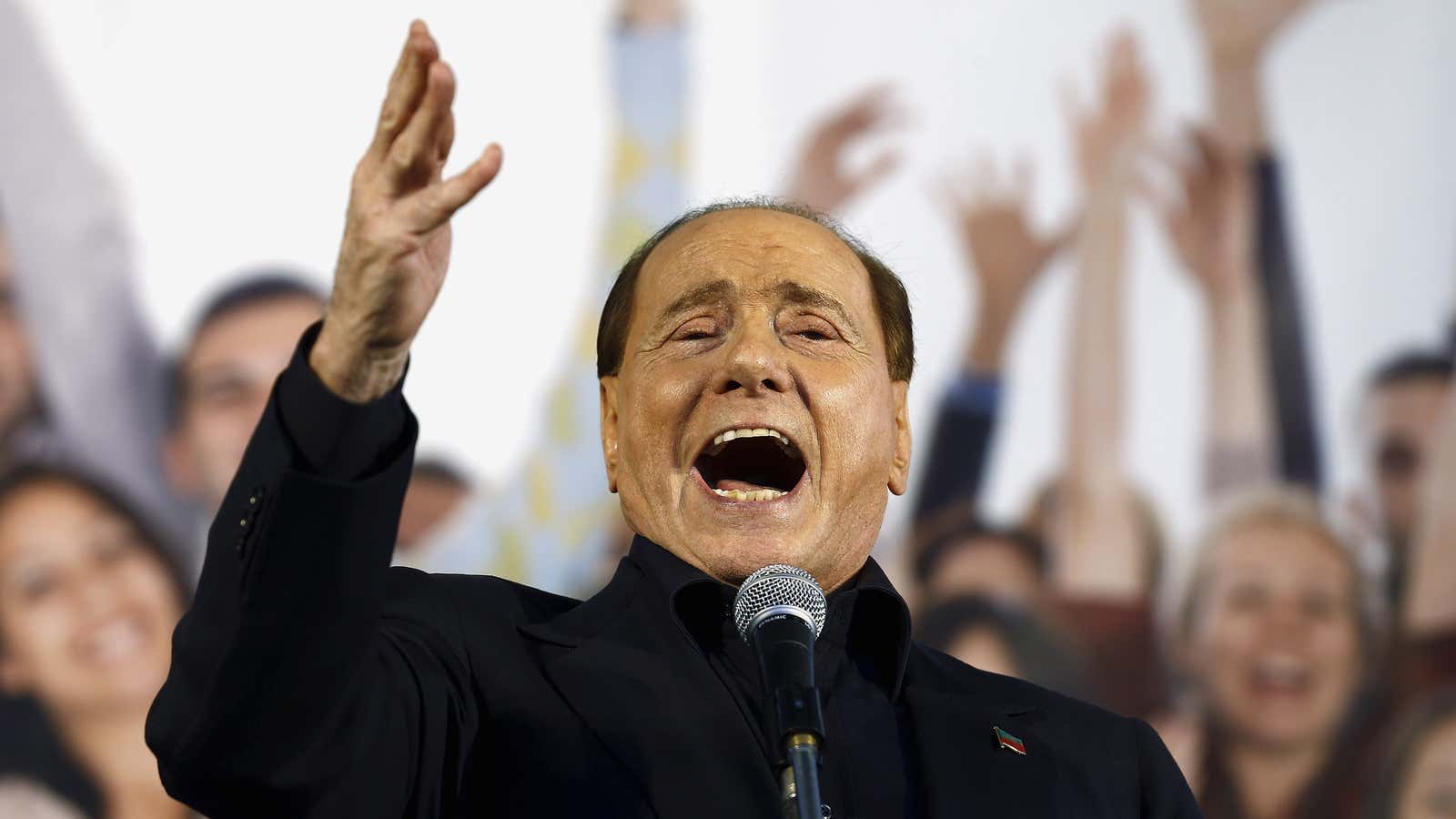Just like Italy in 1994, the US has elected a brash, attention-seeking, entrepreneur-turned-savior of the nation as head of its government. The uncanny similarities between Donald Trump and Silvio Berlusconi have prompted multiple parallelisms during the campaign—and now that the election is over, Italy’s experience continues to offer an important perspective.
Before he was elected, Trump detailed what he hoped to accomplish in his first 100 days in office. Indeed, his ”Contract with the American Voter” echoed Berlusconi’s own ”Contract with Italians,” which was a spectacular act of showmanship that itself was borrowed from a document written by Republicans in the 104th US Congress. For the Americans who did not agree with Trump’s campaign pre-election and who oppose his political agenda now, it’s vital they avoid the mistakes many Italians made before them.
In short: Americans cannot let America become about Trump.
In George Lakoff’s book on the 2004 US election, Don’t Think of an Elephant!, he explains how letting your opponents dominate the conversation usually ensures their victory. In other words, if liberals spend the next four years reacting to Trump instead of being proactive and focusing on what they want, they will lose in 2020.
So far, liberals–and even conservatives—have done a bad job of avoiding this trap. During the primaries, Trump’s Republican opponents spent so much time ganging up on him that they barely were able to talk about themselves; they even explicitly made a coalition with the sole objective to defeat Trump. On the other side, some of the most viral Democratic ads of the election campaign seemed to be not about Hillary Clinton’s plans or successes, but about Trump’s failures. Even Clinton’s best surrogates like Elizabeth Warren or even president Barack Obama seemed to spend most of their time campaigning against Trump instead of for Clinton. Toward the end, it seemed the election had turned into a Trump referendum—a risky strategy that may ultimately have added to his visibility. (An exception to this was Michelle Obama, whose passionate speeches stood out in part because she almost never mentioned Trump’s name; her consistent praise of Clinton defied of the hegemony Trump had imposed on the election.)
Now that Trump has been elected president, however, this trend needs to end. And as Luigi Zingales notes in his essay about ways to resist Trump, Italy provides a textbook example of what happens when you let one personality occupy all the space that the public debate has to offer.
For at least twenty years, Berlusconi dominated Italy’s national identity, both politically and culturally. Of course, this was made easier by his media empire and influence. But the omnipresent attacks, especially when personal, did not help his opponents in the way they thought. Instead, the running criticism gave him 24/7 visibility (as Trump himself knows, and has said, any publicity is good publicity), and even more importantly, the guise of victimhood. Even as he merrily ripped apart the fabric of Italian society, he was somehow able to push the message that he was the one being bullied. It’s a narrative that was appropriated by the Trump campaign repeatedly throughout the election.
It’s unclear whether the opposition in Italy became so obsessed with Berlusconi that it forgot its own ideas, or if it made defeating Berlusconi its sole goal because it had already run out of them. Either way, the end result was that Berlusconi maintained a monopoly over the public’s attention, to the point where his re-election felt like an inevitability. Italians—led by their representatives, and the media—became incapable of imagining a political scene where he wasn’t the main character—hero or villain.
Perhaps the best example of this happened in the 2013 election: Berlusconi, who had been forced, by European Union pressure and protests, to resign as prime minister in 2011 after running the country into the ground, had nowhere near the same amount of support that he had in previous years. It seemed that Italians were finally ready to be done with him. And yet, once the electoral campaign started, the election’s narrative became all about him—and so, his political ghost was summoned, attacked, and fed (by the media and the public, as well as by politicians). He was dragged, once again, to the center of the stage, and once again, he was successful: the coalition he led ended up getting essentially as many votes as his opponents. Today, while Berlusconi himself is not in parliament (due to his criminal record), his political heirs are members of Italy’s coalition government.
True, Trump cannot hold office for twenty years. But his policies can.
From the beginning, Trump has always been an unlikely and erratic presidential candidate. But he was also elected by the many millions of Americans who agree with at least some of his ideas. This means his opponents cannot merely spend the next fours years scheming how to get rid of him, or shaming his behavior—they have to change the minds of the voters who elected him. They are unlikely to accomplish this by attacking him, and they may end up alienating their own supporters.
Divisive candidates, and candidates who are able to exploit the spotlight, take up a lot of space. The way to push back against this kind of personality is by taking that spotlight back. So long as the message remains anti-Trump, the message remains about Trump: Don’t let him become the only story that America has to tell.
